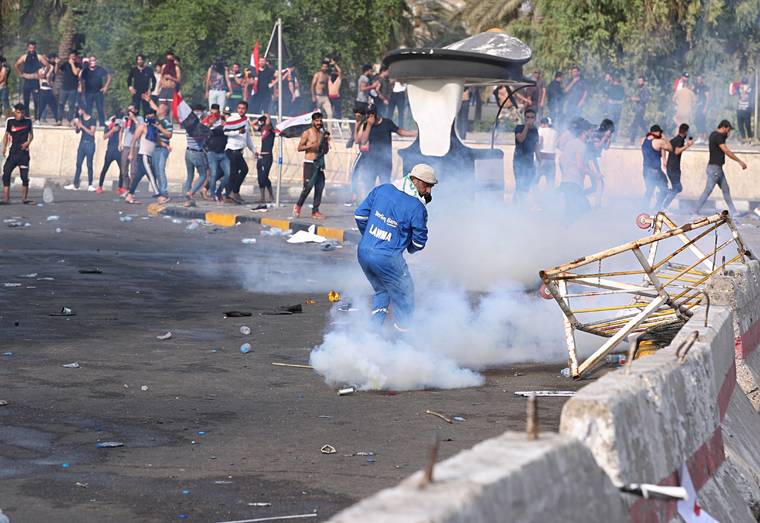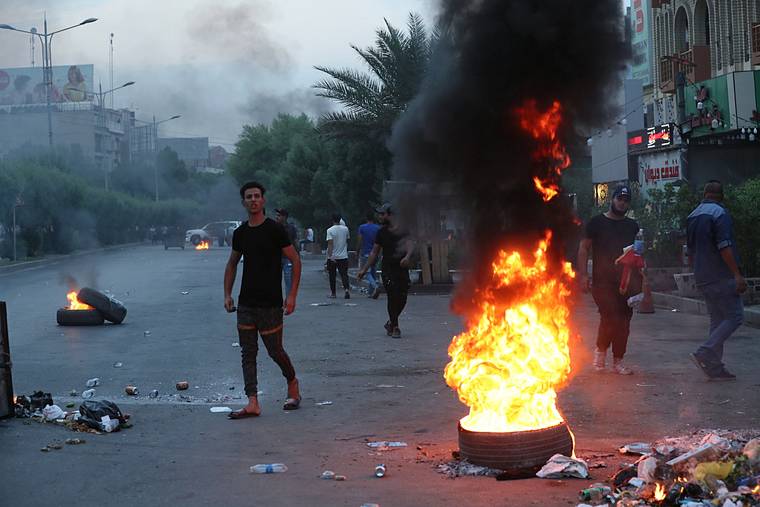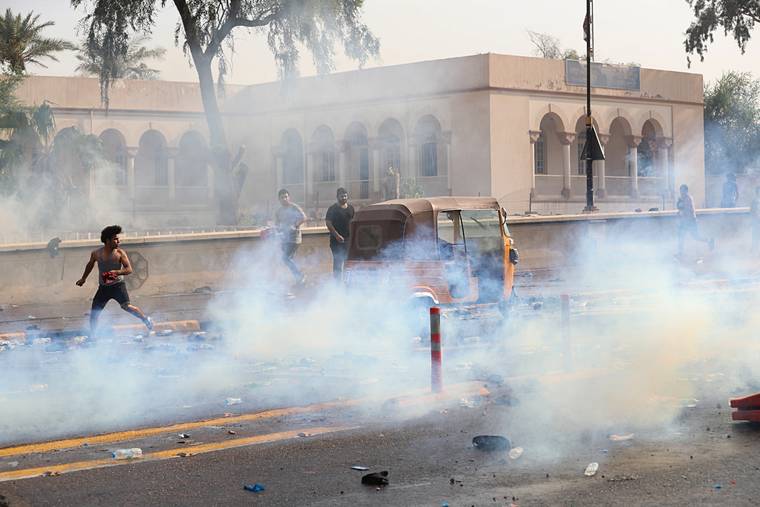BEIRUT — Iraqi security forces fired live bullets, tear gas and water cannons to disperse hundreds of anti-government protesters in Baghdad Tuesday, in hourslong clashes that killed one person and injured 200, according to officials.
The confrontations were some of the worst in the Iraqi capital in more than a year, and signaled that the war-weary country could be facing a new round of political instability.
The Tuesday afternoon rally, which was organized on social media, began peacefully with more than 1,000 people marching into the central Tahrir Square. As some tried to cross the bridge to reach the fortified Green Zone — home to government offices and foreign embassies — police started throwing stun grenades and firing rubber bullets and tear gas to disperse them. Some fell to the ground as they ran away, wiping their eyes.
“We want this government to be changed. This is a government of political parties and militias,” said Fadhel Saber, 21, who was participating in the protest because he is unable to find a job.
As more people converged into the square chanting anti-government slogans, riot policemen began to fire live ammunition to disperse them, scattering the mostly young male protesters, some of whom covered their face with scarves. Other protesters responded by throwing stones at security forces and waved Iraqi flags above the water cannon. Young men were seen carried away, some of them bleeding.
Medical officials said one protester was killed and dozens were injured, some with live and others with rubber bullets, while many others suffered breathing problems because of the tear gas. The officials spoke on condition of anonymity in line with Iraqi health ministry regulations.
A joint statement issued by the Iraqi interior and health ministries said one person was killed and 200 injured, including 40 members of the security forces.
It said it “regretted” the violence that accompanied the protests in Baghdad and several other provinces, blaming “a group of rioters” for the inciting violence, while calling for calm and restraint.
Iraq’s influential Shiite cleric Muqtada al-Sadr called in a tweet on government leaders to launch an investigation into Tuesday’s clashes.
“We want the very basic rights: Electricity, water, employment, and medicine, and nothing else,” said Mohammed Jassim, a protester. “But this government is shooting at the crowd and killed some people,” he added.
The economically-driven protesters said the government should be changed because of its failure to improve public services and create jobs. Many also held posters of a popular army commander — Iraq’s counterterrorism chief, Lt. Gen. Abdul-Wahab al-Saadi — whose recent dismissal from office sparked controversy, with some blaming it on Iran-backed politicians in the country.
Prime Minister Adel Abdul-Mahdi removed him from his post last week and transferred him to the Defense Ministry. Iraqis largely credit al-Saadi with leading the fight against the Islamic State group and many voiced anger at the unexplained move.
Over the past months, protests across Iraq have left scores of people injured. Similar protests and confrontations took place Friday in the southern cities of Basra and Nasiriya.
State-run news agency reported that after the protest took place, Abdul-Mahdi gave orders for the government to assist university graduates to find jobs.
The protesters included dozens of fresh university graduates who are unable to find jobs in the corruption-plagued but oil-rich country.
Mohammed Kadhim, a 27-year-old resident of Baghdad, said the current government is full of “empty promises and lies.”
Also Tuesday, Iraq’s Foreign Minister Mohammed Ali al-Hakim ordered the temporary closing of the country’s consulate in the Iranian city of Mashhad.
The details of the incident were not immediately clear, but an Iraqi official, speaking on condition of anonymity, said Iranian authorities had detained several Iraqi diplomats in the city after they were attacked.
Mashhad is a major center of pilgrimage for Shiite Muslims, who are the majority sect in both Iran and Iraq.
Iraq finds itself growingly caught in the middle of U.S.-Iran tensions in the region, which began after the U.S. withdrawal from the Iran nuclear deal last year.
———
Associated Press writers Murtada Faraj and Ali Abdul-Hassan in Baghdad contributed reporting.




